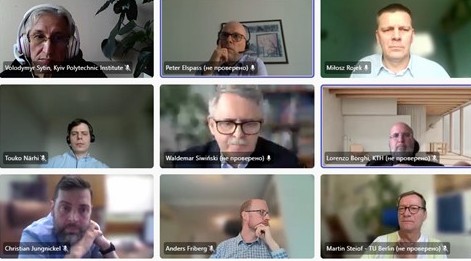 The International Collaboration Department (ICD) staff at Igor Sikorsky Kyiv Polytechnic Institute attended the meeting of the Task Force Benchmark within the CESAER association (Conference of European Schools for Advanced Engineering Education and Research) that took place fully online on 16 April 2025.
The International Collaboration Department (ICD) staff at Igor Sikorsky Kyiv Polytechnic Institute attended the meeting of the Task Force Benchmark within the CESAER association (Conference of European Schools for Advanced Engineering Education and Research) that took place fully online on 16 April 2025.
The Task Force Benchmark hosted a discussion on the European Ranking of Engineering Programmes (EngiRank), featuring Waldemar Siwiński, the architect of this ranking. He serves in additional roles, including as the President of the IREG Observatory, as well as the Founder of the Poland’s Perspektywy Education Foundation. In recognition of his contributions to higher education, Waldemar Siwiński was awarded an honorary doctorate from the Igor Sikorsky Kyiv Polytechnic Institute in October 2017.
This session provided an opportunity to gain deeper insights into EngiRank, initiate an open dialogue to provide feedback on its methodology, as well as to propose future directions with the potential to develop a collaborative input note. It also enabled attendees to discuss takeaways from EngiRank’s findings.
Milosz Rojek from the SGH Warsaw School of Economics presented the EngiRank methodology and the results. According to him, engineering is very important today to solve society’s big challenges. The methodology of this ranking was designed during a series of three seminars in 2017-2018 by representatives of organisations involved in engineering education and six universities, including Kyiv Polytechnic.
EngiRank compilers believe that comparing universities is valid if they operate under similar conditions, particularly within the European Education Area. Currently, the ranking covers seven engineering disciplines with plans to include new subjects such as production engineering in upcoming editions. Milosz Rojek also noted that the expansion of the geographical scope of EngiRank is important, and the next step would be to include universities from the United Kingdom in the ranking. In addition, its future developments are expected to envisage the deeper analysis of patent information.
Attendees also discussed issues related to regional differences, the accreditation of study programmes, the measurement of teaching quality, and unbiased geographical comparison, among others. In conclusion, Milosz Rojek and Waldemar Siwiński welcomed all inputs and feedback, reaffirming their commitment to improving the ranking’s methodology through collaboration, transparency, and informed dialogue.
As EngiRank continues to evolve, it serves not only as a benchmarking tool but as a catalyst for deeper reflection — reimagining the future of engineering education in Europe.
More information:
https://engirank.eu/
